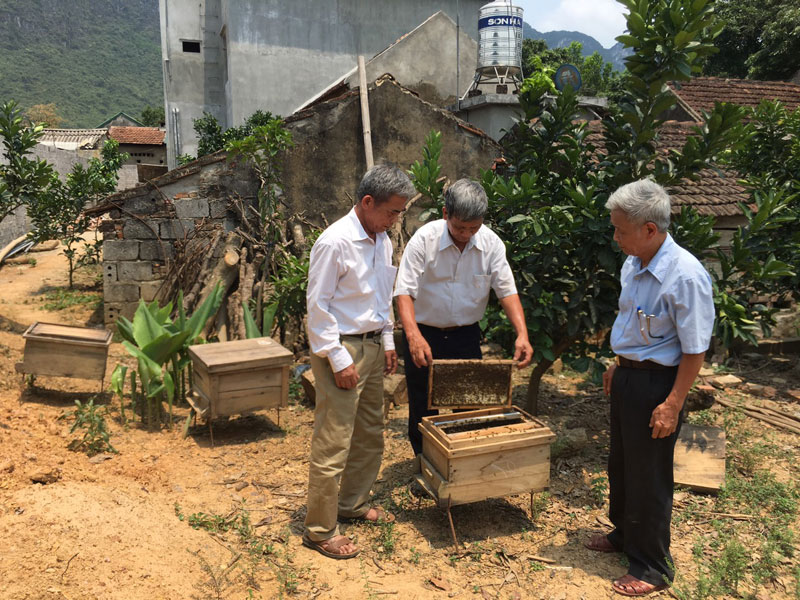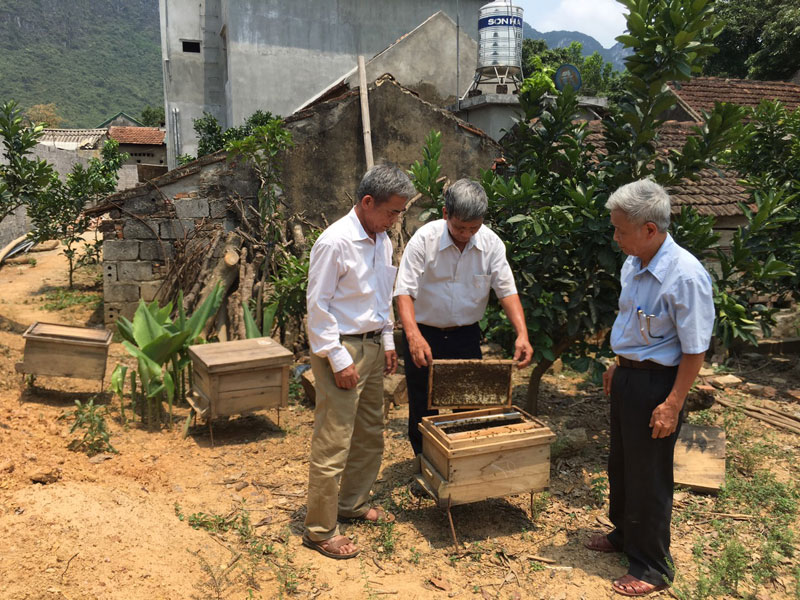
(HBO) – Half of Lac Thuy district’s forest areas of 19,100 hectares are cultivated with longan, litchi and other perennial trees, which serves as a good ground for the development of honey and bee sector. Bestowed with favourable weather conditions, Lac Thuy district has gained high economic efficiency from apiculture. Thanks to its high quality, local honey has met the taste of the market and become the main source of income of many households.
 Duong Van Uu’s family in Hong Phong
village, Yen Bong commune, is now having 200 be swarms of bees. Last year, his
family earned 200 million VND from 2,000 litres of honey.
Duong Van Uu’s family in Hong Phong
village, Yen Bong commune, is now having 200 be swarms of bees. Last year, his
family earned 200 million VND from 2,000 litres of honey.
Duong Van Uu’s family in Hong Phong village, Yen Bong commune, began the job in
1972 and now they are having 200 swarms of bees which generate some 2,000
litres of honey each year. The family earns an average of over 200 million VND
from selling the honey.
Uu said that beekeeping is not difficult but it requires keepers’ carefulness
and deep understanding of the bees’ habitat like bee swarm season and foraging
season as well as various kinds of flowers. Longan, litchi, acacia and eucalyptusare best for bees with honey production.
Foraging season is between February and July, particularly from May, households
harvest honey two or three times a month. Meanwhile, when nectar becomes scare
in the cold season, beekeepers should work to prevent absconding, he said.
With more than 40 years of experience in beekeeping, Ha Huu Huong in Zone 7,
Chi Ne town, has 50 swarms of bees. Last year, he harvested 500 litres of honey
and gained 100 million VND.
"Choosing queen bees is of utmost
importance as they play a decisive role in developing a healthy swarm and
producing high-quality honey. Disease prevention should get due attention. Gearing
towards clean products, our honey has been favoured by many traders. As each
litre of honey is sold at 160,000 VND, our family earn over 100 million VND
each year”, he said.
According to Hoang Dinh Chinh, deputy head of the Lac Thuy district’s bureau of
agriculture and rural development, the trade is not new in Lac Thuy. It was developed
in a small scale, then the model is widened widely thanks to its economic
efficiency. Taking advantage of the forest land, local people have rushed to
farm bees, with 500 households keeping 10,000 swarms. Each year, the district
harvests 120 tonnes of honey and gains over 20 billion VND.
Many people have shifted to beekeeping as this job does not require to big investment
but brings about a stable income. However, it requires high techniques and
carefulness in each stage.
Beekeeping is potential for local economic development, making significant
contributions to the alleviation of poverty and improvement of local livelihoods.
Therefore, Lac Thuy district has worked to encourage local farmers to develop
the bee swarms while planting more forests to create food for bees. Apiculture
is well developed in Yen Bong and Khoan Du commune, and Chi Ne town.
In a bid to make beekeeping as a spearhead in the local economy, local
authorities should give more support to the farmers so that they can develop a sustainable
model and build Lac Thuy honey brand./.
According to data from the Hoa Binh Provincial Party Committee, the industrial production index for the first six months of 2025 is estimated to have increased by 20% compared to the same period last year. This marks the highest year-on-year growth rate for this period since 2020.
In the first six months of 2025, Hoa Binh province’s export turnover was estimated at 1.145 billion USD, marking an 18.11% increase compared to the same period in 2024. Import turnover was estimated at $ 804 million, a 17.15% increase, which helped the province maintain a positive trade balance.
The lives of the ethnic minority farmers in Tan Lac district have gradually improved thanks to the new directions in agricultural production. This is a testament to the collective strength fostered through the professional associations and groups implemented by various levels of the district’s Farmers’ Union.
With the motto the "product quality comes first,” after nearly one year of establishment and operation, Muong village’s Clean Food Agricultural and Commercial Cooperative, located in Cau Hamlet, Hung Son Commune (Kim Boi district), has launched reputable, high-quality agricultural products to the market that are well-received by consumers. The products such as Muong village’s pork sausage, salt-cured chicken, and salt-cured pork hocks have gradually carved out a place in the market and they are on the path to obtaining the OCOP certification.
In the past, the phrase "bumper harvest, rock-bottom prices" was a familiar refrain for Vietnamese farmers engaged in fragmented, small-scale agriculture. But today, a new spirit is emerging across rural areas of Hoa Binh province - one of collaboration, organisation, and collective economic models that provide a stable foundation for production.
Maintaining growing area codes and packing facility codes in accordance with regulations is a mandatory requirement for agricultural products to be eligible for export. Recently, the Department of Agriculture and Environment of Hoa Binh province has intensified technical supervision of designated farming areas and packing facilities to safeguard the "green passport" that enables its products to access international markets.



 Duong Van Uu’s family in Hong Phong
village, Yen Bong commune, is now having 200 be swarms of bees. Last year, his
family earned 200 million VND from 2,000 litres of honey.
Duong Van Uu’s family in Hong Phong
village, Yen Bong commune, is now having 200 be swarms of bees. Last year, his
family earned 200 million VND from 2,000 litres of honey.